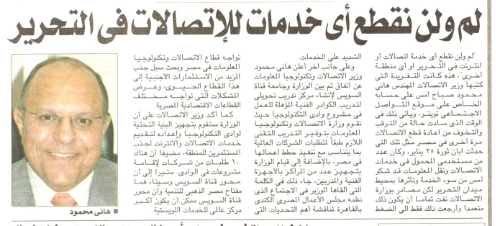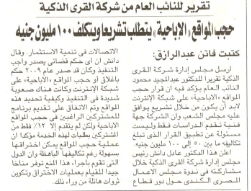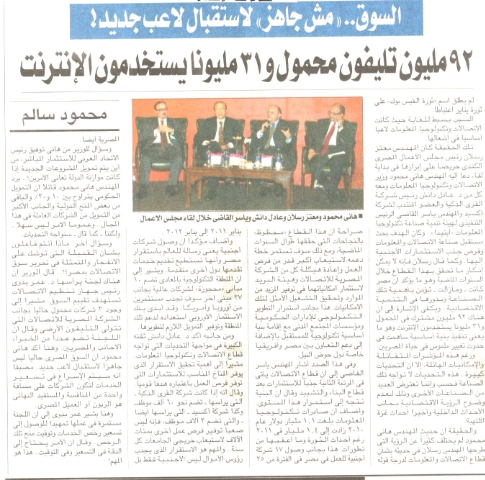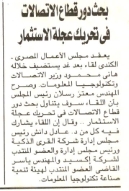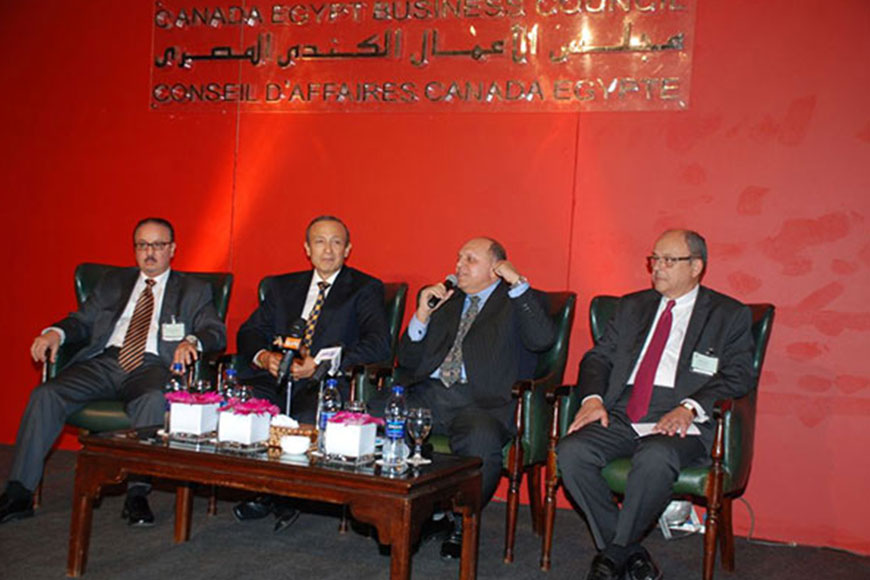
Date
Speaker(s)
Designation
Description
The Canada Egypt Business Council (CEBC) hosted a special event and panel discussion featuring H.E. Hany Mahmoud, Minister of Communications and Information Technology and prominent guest speakers, Eng. Yasser El Kady, CEO, Egyptian Information Technology Industry Development Agency (ITIDA) and Dr. Adel Danish Chairman, Smart Villages Co. and Chairman and CEO, Xceed. The discussion revolved around the prospects in the field of communications and information technology and its role in putting the Egyptian economy back on track.
Over 250 distinguished attendees were present at the event, from ministers, ambassadors, CEBC members and guests, among whom Governors of El Gharbeya and Luxor, former ministers Dr. Mostafa El Said, Dr. Ibrahim Fawzy.
CEBC Chairman, Mr. Motaz Raslan, delivered the opening remarks for the discussion saying that “the communications industry is the most capable sector of playing an effective role in getting the economic growth wheel turning again in the current period”. He sees it as an industry characterized by being fast growing and labor intensive. He welcomed H.E. Hany Mahmoud and commended him for being lenient towards the private sector and a proponent of bureaucracy. In conclusion to his word, the Chairman pointed out that CEBC conducted eight joint missions to Canada since its inception, the most successful of which have been directed towards ICT.
Minister Hany Mahmoud then assumed the floor. The Minister had a celebrated career in the communications field. He was Vodafone’s Regional General Manager for Central Europe and Africa. After the revolution, he returned to Egypt and headed the National Organization for postal services, later he headed the cabinet’s Information and Decisions Support Center before he was assigned the Communications and Information Technology portfolio in Dr. Hesham Qandil’s cabinet.
The Minister started his word by praising the development ICT field has witnessed in Egypt. He added that when he was assigned the portfolio, he and senior officials at the ministry, laid down specific goals for the betterment of the sector. The first of the mentioned goals is how to create jobs through investment in ICT. On the job creation, Minister Mahmoud said that the future is in outsourcing, this includes, call center outsourcing, development outsourcing and IT outsourcing among others. He added that many industries are becoming dependent on outsourcing. Minister Mahmoud also said that they adhere a great deal of importance to supporting SME’s in the field.
Secondly, the Ministry is focused on developing two main institutions; the Egyptian Telecommunications Company and the National Organization for Post. Combined, both institutions employee around one hundred thousand employees. Both also offer services that are becoming obsolete and for them to survive, they have to offer alternative services. He added that while the Egyptian Telecommunications Company can offer more communications service, the National Organization for Post can utilize its uniquely massive network of branches that is present even in the remotest parts of Egypt.
Thirdly, the ministry is concerned with supporting governmental institution. The Minister mentioned ongoing projects in several fields. One of those projects is in collaboration with the ministry of Health, where the ministry is helping put in place a database of patients who will request government-funded health services. The project was aimed at shortening the time of granting approvals for surgeries. The project saved the lives of many, the Minister said. The ministry is also concerned with technologically developing NGOs. One of the projects in this area aims at creating ‘Houses of Technology’, which work on developing and training the community, where the NGOs, clubs or associations serve.
Technological infrastructure in the country is prerequisite to ICT development on the long term, the Minister said. He spoke of plans to introduce high-speed Internet to most of the country by 2017 and of introducing cloud technology. On the other hand, the Minister said that this infrastructure would not be truly nurtured unless the Arabic content on the worldwide web increases, because it is quite weak, according to the Minister. To complete the factors for ICT development, the Minister said that efforts are also directed towards finding affordable outlets and training a work force to be able to operate and maintain this infrastructure.
Finally, African cooperation in the field is also a pillar of the ministry’s plan. The Minister mentioned several examples where Egypt is exporting its expertise in ICT to a number of African states. The Minister said that Egypt has edge in this field in comparison to its African counterparts. He also mentioned that Egypt is currently offering training and consultancy services to some of its African neighbors.
The Minister left the floor to Mr Yasser El Kady to speak about outsourcing, which is one of the main components of the Ministry’s plan to revitalize the ICT sector in Egypt. Yasser El Kady is the CEO of the Egyptian Information Technology Industry Development Agency (ITIDA). The ICT sector specifically faced grave challenges after the revolution, El Kady said. He said that while it was the main driver of the revolution, which erupted through social media networks, such as Twitter and facebook, it became accused of attempting to counter it, when Internet services were interrupted nationwide during the 18 days of the revolution. He added that this incident discredited Egypt’s ICT sector in the eyes of investors. El Kady said that this was corrected by the efforts of Ministry officials among others. He added that despite this setback, the sector was still making progress and he sited an increase in itsexports. He pinpointed that there are 17 off-shoring companies operating in Egypt, who registered a 43 percent increase in the number of employees between January 2011 and January 2012.
El Kady spoke of his role to promote Egyptian businesses in the field and the Ministry’s focus on the private sector. He mentioned supporting SME’s and the allocation of 20 million Egyptian pounds to support them. El Kady also highlighted the importance of opening markets before Egyptian IT companies and in that of investing in developing and improving the quality and caliber of service they provide to give them prominent international standing.
Adel Danish, Chairman of the Smart Villages Company and of Xceed, assumed the floor and addressed the audience from a different perspective on outsourcing, since he heads a company specialized in this field. Danish said that human resources are the true edge for Egypt. He said that Egypt graduates 350 to 400 thousand young men and women a year. He added that while they could be viewed as a liability, they see them as an asset.
On the other hand, Danish said that there are challenges facing the field, but it is possible to achieve the goal, laid down by the Ministry, of employing 500 thousand graduates in outsourcing. He mentioned the success story of India, which employees a massive number of graduates in outsourcing. Comparing the conditions of each country, Egypt does have a shot at achieving a similar success, Danish said. Of the challenges facing the industry,NDanish mentioned human resources, political stability and competition. On competition, he said that Egypt has comparative advantage in the Arab world, however it is unfortunately hindered by the high costs of communications between both countries.
The floor was opened to questions and questioners asked questions on a range of subjects; on the use of technology in the field of agriculture, future cooperation with Canada in the field, easing obstacles in cooperation with the Gulf countries, which is a prime market for Egypt – on which the Minister said change in a positive direction will take place at the beginning of next year– and on funding the Ministry’s plan without burdening the heavily indebted government budget.
Former minister Moushira Khattab summed up the general impression of the audience on the subject, when she commended the positivity of the Minister and the speakers’ outlook on the sector. A refreshingly optimistic overview on an industry, which is pivotal to Egypt’s economic growth was direly needed indeed, as a number of economic indicator predicted that years separate between Egypt and the restoration of its economic growth.


